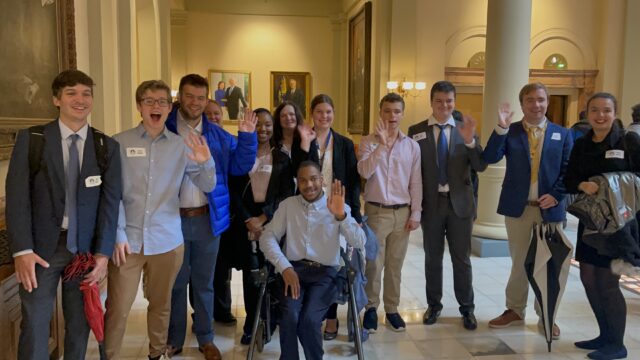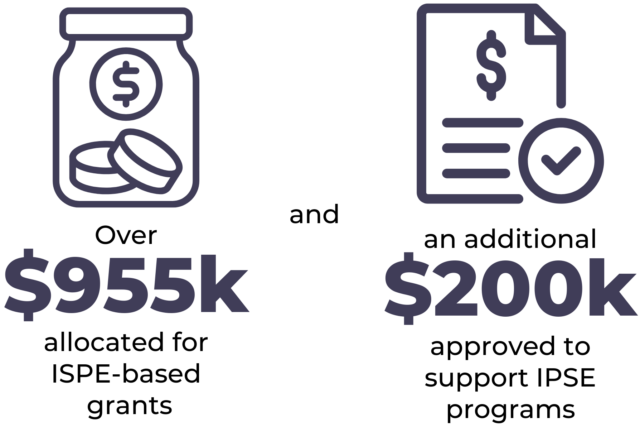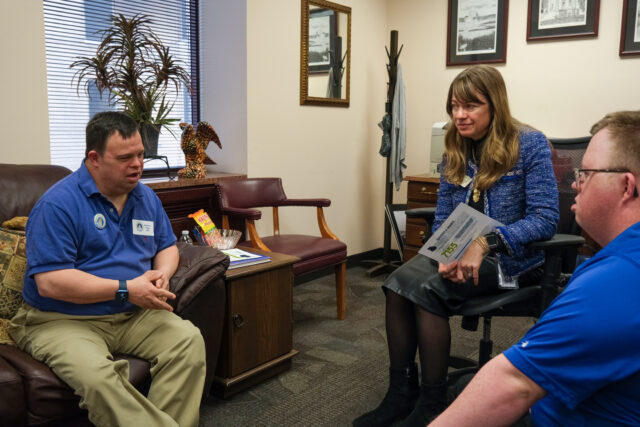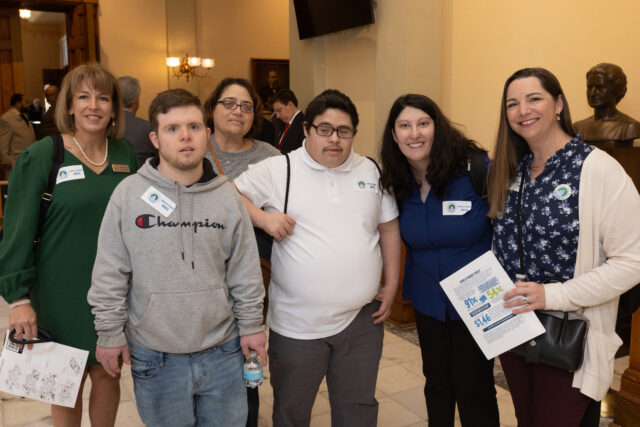With approximately 25% of the representatives being new legislators during this session, a significant portion of the Georgia Council on Developmental Disabilities (GCDD) public policy work focused on making new relationships and educating new legislators on the need for policy change that promotes opportunities for Georgians with developmental disabilities to live, learn, work, play, and worship in their communities.
As seen in previous legislative sessions, GCDD’s Advocacy Days was an integral program allowing individuals from the ID/DD community throughout Georgia to use their voices to advocate for their needs. As a way to increase participation, each Advocacy Day during the 2023 session consisted of a virtual day and an in-person day for advocates. The Advocacy Days’ virtual and in-person aspects consisted of education around identifying, contacting, and connecting with Georgia’s representatives via email, office visits, or meeting them at the ropes at the Georgia State Capitol.
GCDD’s three Advocacy Days focused on the following topics:
Inclusive Post-Secondary Education (IPSE)
 Our first Advocacy Day centered on inclusive post-secondary education (IPSE), which allows students with intellectual disabilities to attend college with their peers who may or may not have a disability. They participate in the same classes, same clubs, same residences, and same athletics as students who may not have an intellectual disability.
Our first Advocacy Day centered on inclusive post-secondary education (IPSE), which allows students with intellectual disabilities to attend college with their peers who may or may not have a disability. They participate in the same classes, same clubs, same residences, and same athletics as students who may not have an intellectual disability.
During our IPSE Advocacy Day, our most significant legislative push was for advocates to ask for their representatives to support HB-185, which Representative Houston Gaines sponsored. HB-185 would supply grant-based financial support to those with intellectual disabilities to cover tuition and fees at a Georgia college with an IPSE program. Currently, only nine Georgia colleges have an active IPSE program. Therefore, future advocacy will focus on expanding IPSE programs within Georgia colleges.
Results:
 An unforeseen setback did prevent HB-185 from passing through the House. However, with Representative Houston Gaines and the public policy team’s quick work, we got the bill’s language included in SB-246, which was passed. Therefore, over $955,000 has been allocated in this year’s state budget to allow for students with intellectual disabilities to receive ISPE-based grants so they can attend one of the nine ISPE programs available in Georgia. Furthermore, an additional $200,000 was approved to support IPSE programs.
An unforeseen setback did prevent HB-185 from passing through the House. However, with Representative Houston Gaines and the public policy team’s quick work, we got the bill’s language included in SB-246, which was passed. Therefore, over $955,000 has been allocated in this year’s state budget to allow for students with intellectual disabilities to receive ISPE-based grants so they can attend one of the nine ISPE programs available in Georgia. Furthermore, an additional $200,000 was approved to support IPSE programs.
Increased Waivers and Wages

On the second Advocacy Day, GCDD focused on increasing waivers and wages. Our advocacy for increased waivers and wages focused on NOW/COMP waivers, providing support for Georgians with disabilities to live in their communities. NOW stands for New Option Waiver program and COMP stands for Comprehensive Support Waiver program. Currently, approximately 226,000 caregiving families support someone with ID/DD in Georgia. This accounts for 6% of all Georgia households. There is a high bar to be eligible for NOW or COMP, and only a limited number of Georgians with ID/DD qualify. However, over 7,000 Georgians with ID/DD are not receiving the necessary support to live with dignity in the community.
There is a critical need to invest in NOW/COMP waivers and livable wages for the Direct Support Professionals (DSPs) that support them. Therefore, during Advocacy Day two, participants were tasked with talking to their representatives about the following:
- Funding approximately 2,400 additional NOW/COMP waivers for$46 million in FY 2024 budget.
- Raising wages for DSPs to $22.48 an hour in the FY 2024 budget.
-
Ensuring the creation and funding of a two to five-year plan to fully fund the waiver waiting list. Create the ID/DD Home and Community Based Services (HCBS) Commission on Reform and Innovation

Results:
With the passing of HB-19, there was a slight increase in wages for DSPs to a little over $17 an hour. It was not the increase that we wanted but was a move in the right direction. Furthermore, an additional 500 waivers were included in this year’s budget. With last year’s 513 waivers and this year’s additional 500 waivers, Georgia is starting to make progress regarding adequate care for the ID/DD community.
Advancing Employment First and Ending Subminimum Wage

Our last and final Advocacy Day centered on advancing Employment First and ending subminimum wage for those with ID/DD. Advocates were tasked with emailing or having an in-person meeting with their state representative to strengthen Employment First options and end subminimum wage practices. Georgians with ID/DD want real jobs and deserve real wages.
This is why advocates asked for their representative’s support on the following bills:
- HR-168: This bill would reignite the Georgia Employment First Council. Georgia’s Employment First Council would develop recommendations to phase out Georgia’s use of subminimum wages for workers with ID/DD. The Council would also encourage and promote competitive integrated employment (CIE) options.
- SB-198: This bill would create the Georgians with Intellectual and Developmental Disabilities Innovation Commission. This commission would prioritize employment to meet the 54% of people with ID/DD who want a job but don’t have one.
Results:
Unfortunately, neither bill passed through the House or Senate. However, our advocacy for advancing Employment First and ending subminimum wage continues. We at GCDD are dedicated to pushing for equal pay and employment for those in the ID/DD community.
Other Important Legislation Observed During Session:
Along with Advocacy Day and the bills we advocated for our representatives to support, here are some additional pieces of legislation that we observed during the session:
- SB 140: (Passed) This bill prevents healthcare providers from offering any type of sex reassignment surgeries, surgical procedures, or hormone replacement therapy to minors (those under 18 years old). We wanted to keep tabs on this bill because “developmental conditions and the autism spectrum disorder” is directly mentioned. Therefore, moving forward, we want to brace for any latent functions of its passing.
- SB 84: (Passed) This bill is also called the “Georgia Uniform Securities Act of 2008” and provides financial protection to disabled and elder adults from possible financial exploitation.
Legislation to watch in the 2024 session:
The following bills didn’t pass during this legislative session, but we want to monitor for the 2024 session.
- SB 4: Also known as the “Blind Persons’ Braille Literacy Rights and Education Act,” this bill would require elementary and secondary education programs to conduct evaluations to determine and meet the additional needs of blind and visually impaired students to promote academic success.
- HB 122: This bill is related to the higher education savings plan and Georgia Achieving A Better Life Experience (ABLE), and would provide for the governance of the Georgia ABLE program by the Georgia Higher Education Savings Plan’s board of directors. Although this bill isn’t focused on the ID/DD community specifically, it could lead to cost-effective tuition on IPSE programs, which may allow for more students admitted into IPSE programs.
- HB 520: GCDD monitored HB 520, which was a continuation of the work of the Behavioral Health Reform and Innovation Commission. The work began last year with the passage of HB 1013. HB 520 contained many provisions to improve mental healthcare in Georgia, such as funding targeted studies, supportive housing programs, and expanding student loan forgiveness programs for mental health providers. Some provisions were specifically related to the definition and treatment of autism spectrum disorder, which is particularly relevant for the disability community. HB 520 passed the House almost unanimously, but certain sections faced scrutiny in the Senate. The final Senate version cut approximately 25% of the bill, reducing it from 44 pages to 31. Ultimately, HB 520 was never called for a full Senate vote due to the delays and opposition in the committee. But, HB 520 will still be viable next year and GCDD will continue to monitor it then.
Moving Forward
We at GCDD and the Department of Behavioral Health and Developmental Disabilities (DBHDD) are elated with this session’s strides toward inclusion and equity for those in the ID/DD community. Due to the hard work and dedication of the GCDD public policy team, the representatives who supported our causes, the advocates who gave their all during our advocacy days, and many others, we made significant progress during this session.
With that said, there are still more issues that need to be advocated for and problems that need legislative solutions. To ensure we keep with this momentum, here are some steps we all can take to continue our advocacy during the legislative off-season:
- Attend state agency board meetings to learn how to be involved all year round.
- Please stay connected with your representatives (find your rep. here) and the Governor’s office via email or phone, and continue to inform them about important issues that impact the ID/DD community. That way, we can start to influence the next budget.
- Lastly, make sure you stay connected with us at GCDD through our website, email, and all of our social media platforms to learn of additional off-season advocacy opportunities.
Until the next session, we encourage you to continue to create and share space for education, advocacy and connection. Our teamwork and love for this community give us the momentum and strength to keep moving forward. We have made some amazing progress, but many obstacles remain to overcome. With continued advocacy, we will influence more positive change with, and on behalf of Georgia’s beloved ID/DD community.
